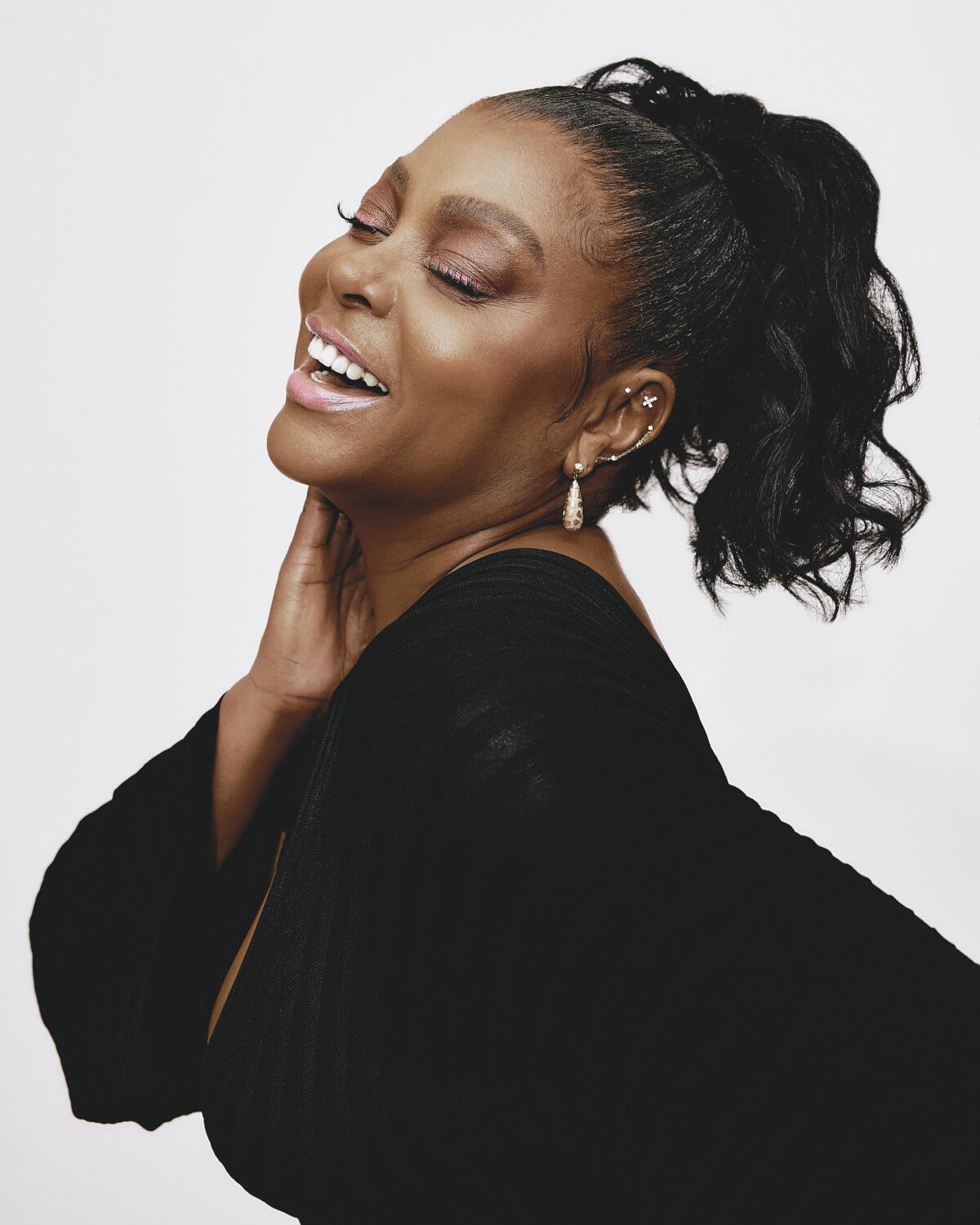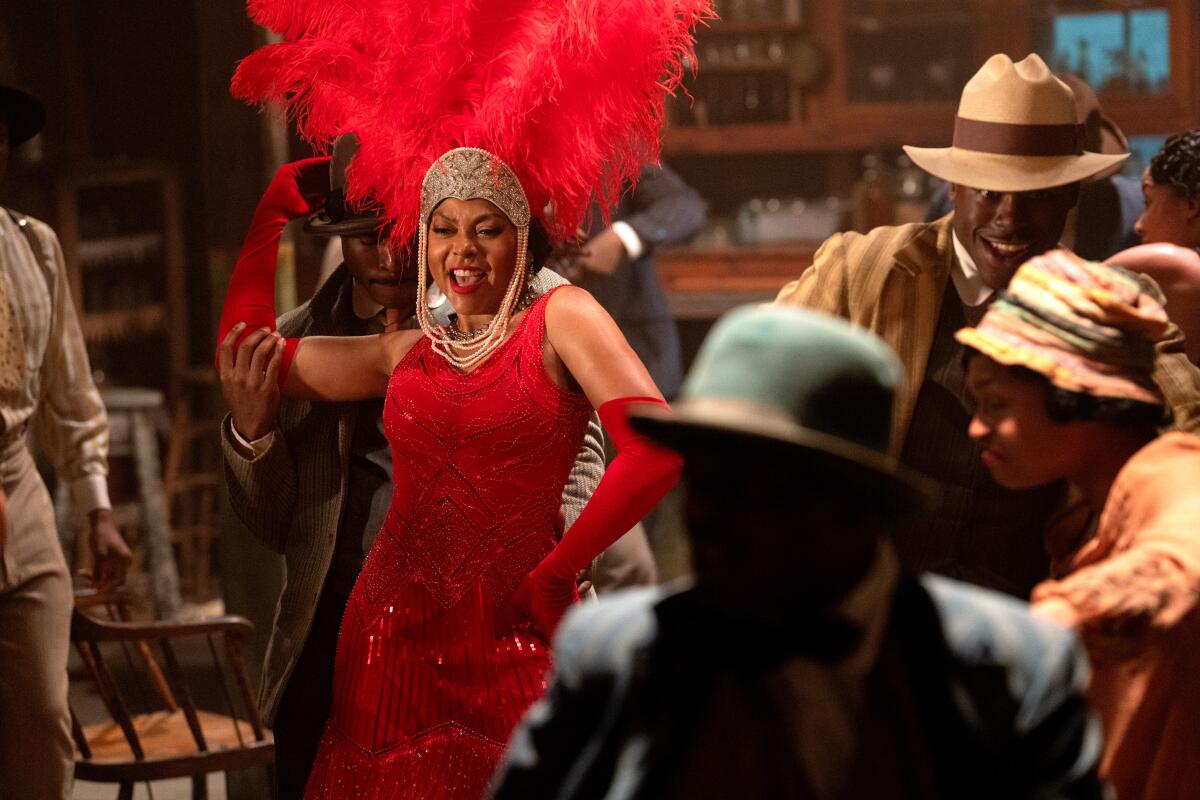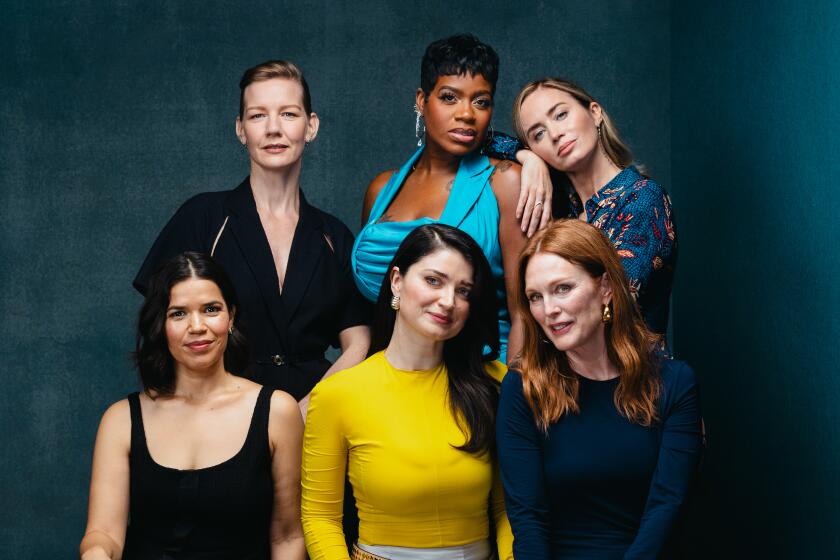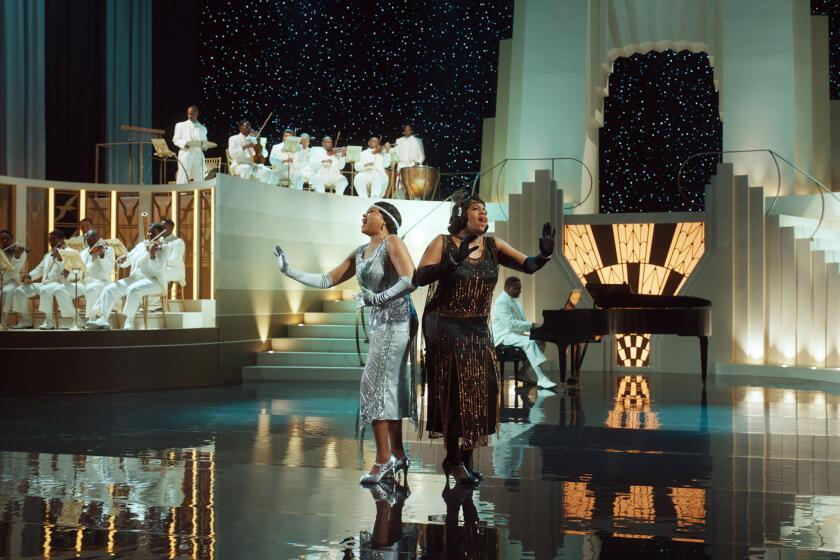‘The singing was daunting to me’: Taraji P. Henson on ‘Color Purple’ and revenge love

- Share via
When “The Color Purple” director Blitz Bazawule cast Taraji P. Henson for his film adaptation of the stage musical, it wasn’t the first time Henson had been asked to slip on the spangled gowns and outsize feather headdresses of enticing blues singer Shug Avery. But back when the offer was for the Broadway production, Henson didn’t feel like she had the pipes to belt it out eight shows a week.
The movie opportunity was providence calling. “If something is meant for you, you can’t run from it,” says Henson, who said yes this time, then phoned Margaret Avery, the original Shug in Steven Spielberg’s 1985 adaptation of Alice Walker’s novel. “She was like, ‘I have all the faith in you,’” Henson says. “And I was like, ‘I just want to make you proud.’ Because when someone believes in you, it’s the wind beneath your wings, you can fly.”
What did Fantasia Barrino, who stars as Celie, mean when she said you’re the real-life Shug, and she has videos to prove it?
I have no idea. But I’ve been hearing that my entire career. I’m so not Cookie [from the TV drama, “Empire”]. I don’t beat my children with brooms. I never sold crack. I’m a trained actress. But I’m grateful that [Fantasia] said that because that means I did a good job. I pat myself on the back because it means I did something that made them believe that this is who I really am. And it couldn’t be further from the truth. [Shug] is so different from me.
Fantasia Barrino, Emily Blunt, America Ferrera, Eve Hewson, Sandra Huller, Julianne Moore offer insights into their work.
What’s your theory about what Shug sees in Colman Domingo’s violent antagonist, Mister?
Here it is. It’s a little bit of revenge love there. Go with me here. Remember: She was shunned by her father for living a secular life and being unapologetically herself. Well, clearly, she was looking for love in [Mister] because she laid down and had babies with him. She always wanted a husband, but he never married her. He married another woman. He slighted her twice. He didn’t marry her when she had the babies. Then when his wife died, he didn’t come back to her. So now she’s using him for sex, and that’s revenge love. In her mind, she’s in control. And that’s a sordid and twisted way to think. But she’s broken and in pain. And this is how she copes, how she feels good about what she does. She wants love so much but doesn’t really know what it looks like. And the way she jumps from man to man, she’s probably afraid of it as well.

In bringing alive a beautiful, flamboyant charmer not playing by conventional rules, who did you look to for inspiration?
She’s a combination of women. But when I was a kid, my mother did a great thing. I don’t even think she fully realized how it fed my creativity as a child. I have a big family, and I was the only cousin that’d get shipped down South to stay with my grandparents in the summer. I was a student of human nature, the kid in the corner, watching the grown-ups. I’m a great mimicker. I’ve played a lot of Southern women in my career, and I owe it to my mother, my grandmother and being around these women with incredibly rich stories. It’s the South. All you have is time. There’s nowhere to rush, no distraction. I’d hear the most amazing stories from these women, who came up in a time when it wasn’t cool to be a woman.
What part of Shug’s show-stopping “Push Da Button” kept you up at night?
I’m not really a dancer. Dancers, they need to get all their credit. Let’s be real. I call myself a mover-weller. I know the eight count. I know when to come in. I can put a little something on it. So the moving part was OK. I took musical theater in college. But the singing was daunting to me. Here I am with Fantasia, whose voice is anointed. [Co-star] Danielle [Brooks] did Sofia on Broadway and has played Mahalia Jackson. We had Tamela Mann, an incredible gospel singer. And you got me — just shakin’ in my boots.
Musician-turned-filmmaker Blitz Bazawule talks about transforming Alice Walker’s deeply moving book “The Color Purple” into an inventive musical that leans into Celie’s imagination.
Did you always know you’d click with Fantasia?
I’d been a fan of Fantasia since she laid on that floor [on “American Idol”] and sang “Summertime,” because, I swear, she was singing to me. I voted for her until my finger was numb. I’ve always been a fan of hers — and she says the same thing about me. We always wanted to meet each other. It was kismet. So it was easy. The chemistry was natural.
Talk about improvising a wild dancing and drinking scene between Shug and Mister.
We had so much fun. That wasn’t written. There was just a little direction [in the script], something like, “Shug and Mister are kissing on the sofa.” It’s beautiful when I get with an actor who challenges me. Colman was so professional. He said, “Can I do…?” And I said, “Listen: I don’t want to know what you’re going to do. Just do it. I’m good. I know you got me. I know you’re no weirdo.”
More to Read
From the Oscars to the Emmys.
Get the Envelope newsletter for exclusive awards season coverage, behind-the-scenes stories from the Envelope podcast and columnist Glenn Whipp’s must-read analysis.
You may occasionally receive promotional content from the Los Angeles Times.









